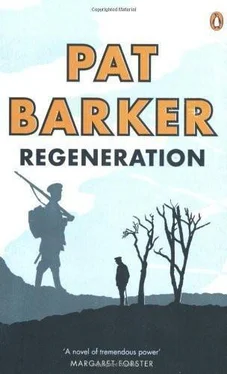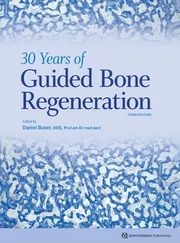‘I’ll keep in touch,’ Sassoon said.
‘Yes. Try and see me before you leave England.’
They shook hands. Then Sassoon, glancing sideways at the colonel and the major, smiled a distinctly conspiratorial smile and came smartly to the salute. ‘Thank you, sir.’
For a moment, it was Callan standing there. Then the electrical room at Queen Square faded, and Rivers was back at Craiglockhart, on the black and white tiled floor, alone.
He returned to his desk, and drew a stack of files towards him. He was writing brief notes on the patients who’d been Boarded that day, but this he could do almost automatically. His thoughts wandered as he wrote. He wasted no time wondering how he would feel if Siegfried were to be maimed or killed, because this was a possibility with any patient who returned to France. He’d faced that already, many times. If anything, he was amused by the irony of the situation, that he, who was in the business of changing people, should himself have been changed and by somebody who was clearly unaware of having done it.
It was a far deeper change, though, than merely coming to believe that a negotiated peace might be possible, and desirable. That at least it ought to be explored. He remembered telling Head how he had tried to change his life when he came back from Melanesia for the second time and how that attempt had failed. He’d gone on being reticent, introverted, reclusive. Of course it had been a very introverted, self-conscious attempt, and perhaps that was why it hadn’t worked. Here in this building, where he had no time to be introverted or self-conscious, where he hardly had a moment to himself at all, the changes had taken place without his knowing. That was not Siegfried. That was all of them. Burns and Prior and Pugh and a hundred others. As a young man he’d been both by temperament and conviction deeply conservative, and not merely in politics. Now, in middle age, the sheer extent of the mess seemed to be forcing him into conflict with the authorities over a very wide range of issues… medical, military. Whatever. A society that devours its own young deserves no automatic or unquestioning allegiance. Perhaps the rebellion of the old might count for rather more than the rebellion of the young. Certainly poor Siegfried’s rebellion hadn’t counted for much, though he reminded himself that he couldn’t know that. It had been a completely honest action and such actions are seeds carried on the wind. Nobody can tell where, or in what circumstances, they will bear fruit.
How on earth was Siegfried going to manage in France? His opposition to the war had not changed. If anything it had hardened. And to go back to fight, believing as he did, would be to encounter internal divisions far deeper than anything he’d experienced before. Siegfried’s ‘solution’ was to tell himself that he was going back only to look after some men, but that formula would not survive the realities of France. However devoted to his men’s welfare a platoon commander might be, in the end he is there to kill, and to train other people to kill. Poetry and pacifism are a strange preparation for that role. Though Siegfried had performed it before, and with conspicuous success. But then his hatred of the war had not been as fully fledged, as articulate, as it was now.
It was a dilemma with one very obvious way out. Rivers knew, though he had never voiced his knowledge, that Sassoon was going back with the intention of being killed. Partly, no doubt, this was youthful self-dramatization. I’ll show them. They’ll be sorry. But underneath that, Rivers felt there was a genuine and very deep desire for death.
And if death were to be denied? Then he might well break down. A real breakdown, this time.
Rivers saw that he had reached Sassoon’s file. He read through the admission report and the notes that followed it. There was nothing more he wanted to say that he could say. He drew the final page towards him and wrote: Nov. 26, 1917. Discharged to duty.
Fact and fiction are so interwoven in this book that it may help the reader to know what is historical and what is not. Siegfried Sassoon (1886–1967) did, in July 1917, protest against the continuation of the war. Robert Graves persuaded him to attend a Medical Board and he was sent to Craiglockhart War Hospital, where he came under the care of Dr W. H. R. Rivers, FRS (1864–1922), the distinguished neurologist and social anthropologist, who then held the rank of captain in the RAMC. During Sassoon’s stay he formed a friendship with one of Dr Brock’s patients, Wilfred Owen (1893–1918), though it is probably fair to say that this friendship played a more central role in Owen’s life, then and later, than it did in Sassoon’s.
Rivers’s methods of treating his patients are described in ‘The Repression of War Experience’ (Lancet , 2 Feb. 1918) and in his posthumously published book Conflict and Dream (London, Kegan Paul, 1923), in which Sassoon makes a brief appearance as ‘Patient B’.
Dr Lewis Yealland’s rather different methods of treating his patients are described in detail in his book: Hysterical Disorders of Warfare (London, Macmillan, 1918).
There is an interesting discussion of Rivers’s pre-war work with Henry Head on nerve regeneration, and the concept of protopathic and epicritic innervation which evolved from it, in ‘The Dog Beneath the Skin’ by Jonathan Miller (Listener , 20 July 1972).
The amendments suggested by Sassoon to the early draft of ‘Anthem for Doomed Youth’ appear in Sassoon’s handwriting on the MSS. See Wilfred Owen: The Complete Poems and Fragments , Vol. II, edited by Jon Stallworthy (Chatto & Windus, The Hogarth Press and Oxford University Press, 1983). Two modern texts which contain stimulating discussions of ‘shell-shock’ are No Man’s Land: Combat and Identity in World War I by Eric Leed (Cambridge University Press, 1979) and The Female Malady by Elaine Showalter (Virago Press, 1987).
Julian Dadd, whose psychiatric illness caused Sassoon some concern during his stay at Craiglockhart, subsequently went on to make a complete recovery.
I’m grateful for help received from the staff of the following libraries: Sheffield Public Library, Newcastle University Medical Library, Cambridge University Library, Napier Polytechnic Library, Edinburgh (formerly Craiglockhart War Hospital), The Oxford University English Faculty Library, the Imperial War Museum, and St John’s College, Cambridge, where the Deputy Librarian M. Pratt did much to make my visit interesting and enjoyable.












